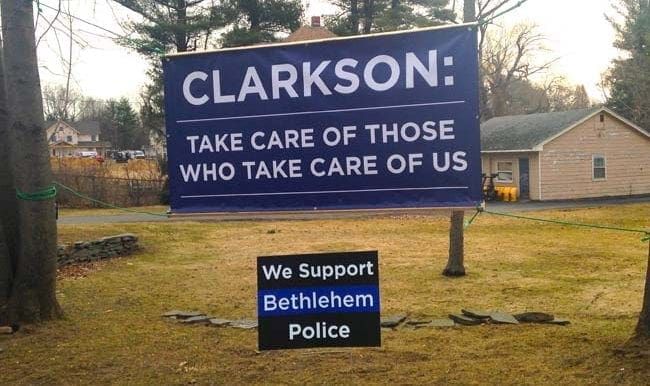As contract negotiations continue between the town and its police force, signs supporting the officers have appeared on resident lawns and businesses in recent weeks. In an effort to improve their image, the town’s two police unions have hired a public relations firm to better promote community engagement. This also comes at a time when police across the country are under pressure to be more transparent, and improve oversight. “We thought we needed to get back in touch with the community,” said Bethlehem Police Supervisor’s Union President Stephen Kraz, who also spoke on behalf of Police Benevolent Association President Michael Berben. “We want a kid on the street to be able to go up to a cop and ask them how they’re doing or for help if they need it. We want that interaction.” The two unions hired Mercury Public Affairs at the beginning of the year. The firm is now providing guidance on community outreach. Both unions have started Twitter accounts and hope to be more active on social media. They are also getting help with their annual fundraiser. The signs were a collaborative effort between the unions and the PR firm.
“There have been some tensions with the labor dispute going on,” said Kraz. “We’re not going to be victimized by these new policies and we want to illustrate that the community does support the police.” In December, new management policies were put in place at the police department in order to curb overtime spending. The changes were instituted after a consultant hired by the town released several reports showing overtime was far greater in the police department than other areas, though numbers in the highway and water departments were also high. One report showed the police went over its overtime budget by $227,528 in 2013. To address the issue, the 2015 work schedule for patrol officers has been reconfigured, and a headquarters sergeant is being shifted to the patrol unit. The sick leave and time off policy was also changed, with officers now required to put in for time off sooner, except in emergency situations. A medical note is now also required for those who are out sick for two or more days. This is meant to help save funds since each time someone calls in sick, the officer who covers the shift is paid overtime. The police do not have a set number of sick days, but have unlimited time, which is contractual. According to the report, the average officer used 169.5 sick hours last year, which equals 21.2 days per officer. The new measures were put in place by Supervisor John Clarkson, who worked with Police Chief Louis Corsi, though the unions said they weren’t consulted. Staffing levels are also an issue as the unions claim positions have not been restored to what they feel were appropriate numbers in 2007 at 44 officers. The town claims 41 officers were on duty in 2007. Clarkson earlier argued that other police departments, like Guilderland, are working at similar staffing levels and that it would cost an additional $1 million a year to hire seven more officers. At this point he is not willing to recommend the hiring of any more officers. Kraz said since the new policies have been put in place there are 17 active labor disputes against the town between both unions. Most of the complaints are about officer not being granted time off. “These disputes are costly to the taxpayers,” said Kraz. “We’re trying to work with the town. We feel we have done our part, and now we want John to did his part.” Kraz said the new policies are too subjective, and it’s been hard to fairly grant time off and sick leave to officers, but they are doing their best. The supervisor said he and the Town Board also share in the same sentiments of the signs, and support the police. “The Board and I want (residents) to know that our efforts to manage efficiently have to include overtime, a major budget item of longstanding concern. We understand that this can cause some friction, but it’s our job to be responsible managers. No one should misinterpret this as a lack of respect for the police officers or other town employees who diligently serve, because we very much appreciate their service,” wrote Clarkson in a statement also used in his April newsletter. Clarkson said they found no correlation between the number of officers and the amount of overtime spending, adding overtime spending in the police department was higher in the early 2000s when there were more officers. He said the new policies have been working with overtime spending down 20 to 30 percent so far this year. However, the officers claim the new policies are affecting the quality of life for themselves and their families. Kraz said one new officer is assigned to work six of our seven days, as well as split shifts. “It causes mental and physical wear on the body,” said Kraz. “We want to make sure they are on their game. I must say the guys are doing an exceptional job for what is going on. There’s a lot of pressure every day.” The issue is set to become a focal point in the fall campaign season, as Republicans have already said it concerns “public safety.” Kraz also said the unions have backed candidates in the past. “I think there’s this bad connection that by putting these policies in place, we don’t support the police, but that’s not true,” said Clarkson. “Having a good policy in place means we do support the police because without it the town couldn’t afford cost of living increase and similar expenses. Not having the policy could be more difficult for everyone.”
Signs of support
Leave Comment



